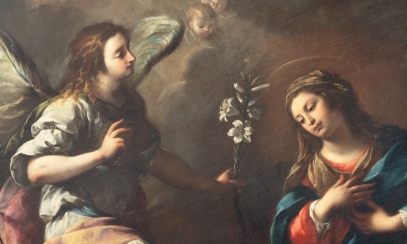
An Exercise on Love
Let’s engage in an exercise about love. This will require that we place ourselves in that time when we believe that we were truly in love; it is not enough for us just to reflect on past love and its results. We have to remember what it was like at the time. Here we will borrow some thoughts from my brother, Bishop John Doerfler of the Diocese of Marquette (the Upper Peninsula).
At the time that we were in love, did we consider that it would be temporary or permanent? Now, again, this is not looking back knowing how it turned out; it is how we felt at the time. Did we think our loving was to be unfaithful or faithful? Did it occur to us that we wanted this to be only a partial love or a total love? Was this a conditional love we were offering or an unconditional love? Was this a fruitless love or a fruitful and live-giving love? Were we being selfish or self-giving? Again, remember not how we might look back on what happened, but how we were at that time. Were we offering a controlling love or a freeing love?
Obviously, when we are deeply in love with someone, we have an intense desire for the second of all these options. We want our love and the love from the other to be faithful, total, unconditional, fruitful and live-giving, self-giving and freeing. Now, due to sin in our life and in the life of the other, these desires are rarely met. Still, if we are basically healthy in all senses, we are aware that these are our desires. They are planted in us by God.
What is more, we see these qualities manifested in the love God has shown for us in his Son, Jesus Christ. Jesus shows us how to be fully human, to be loving like God since God is love.
This is always the context within which the Church understands and teaches her beliefs about marriage and chastity and celibacy and sexual activity. The Church does not just make up her teachings. They are grounded in God, who is true love, and who calls us to that love. Though we know that our feeble attempts will not reach such noble heights this side of the grave, nonetheless, we strive, with God’s grace, to do our best to follow Jesus, who is the way and the truth and the life. This makes us restless as we yearn for true love, a restlessness that will only be satisfied in God, as St. Augustine has taught us.
Augustine also confessed that in his own restlessness he, too, often looked in the wrong places to satisfy his yearnings. We must be fully aware that we, too, can often turn to false ways of “satisfying” our need to love and be loved. These false loves can often turn into idols for us, and we convince ourselves that we cannot live without these false idols. Seek, instead, to rest in the Lord and his overwhelming love for us as the only sure fountain to satisfy our thirst, for he thirsts for us far more than we thirst for him and for love.



